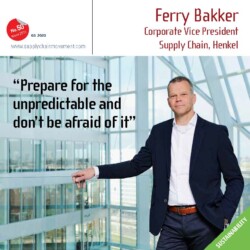Compliance issue requires cross-functional approach

In addition to all the disruptions in their supply chains, companies face more and more legislation on sustainability. It is not just government agencies that enforce these, but increasingly NGOs and other interest groups. During Supply Chain Media’s Webinar Wednesday, Jackson Wood from Descartes explained how companies can resist this by engaging in a cross-functional approach. “Maybe your supply chain is under the magnifying glass of an interest group you don’t know yet.”
By Marcel te Lindert
The term ‘VUCA’ was introduced by the US military 20 years ago, but has only reached a wider audience in recent years. The letters stand for Volatility, Uncertainty, Complexity and Ambiguity. “Complexity has long been a constant factor in international trade, but volatility, uncertainty and ambiguity have also increased in recent years. This poses major challenges for supply chain professionals at global companies,” said Jackson Wood, Director of Industry Strategy, Global Trade Intelligence at Descartes. “Many people question whether today’s VUCA world heralds the end of globalization. I wouldn’t go that far, but there is a clear trend towards nearshoring and friendshoring.”
Everyone understands that the aerospace, defence and semiconductor industries are affected by geopolitical conflicts, resource scarcity and other supply chain disruptions. Wood stressed that these disruptions can affect any company in any sector. He showed examples of the US blocking shipments of avocados from Mexico, and China restricting imports of Canadian beef. “Who would have thought that the avocado and beef markets would be hit by these kinds of measures? You might not think you are at risk if you trade in socks and underwear. But if those are made of cotton from China’s Xinjiang province where Uyghurs are involved in forced labour, you can count on getting questions.”
Guilty until proven innocent
Some disruptions are completely unexpected, giving companies no time to prepare for them. One example is the bridge collapse in Baltimore after being hit by a container ship. “Who would have ever thought that a container ship going off course would paralyse one of North America’s biggest ports? It’s unlikely that companies in the region had contingency scenarios ready for this,” Wood stated. “But other disruptions can be seen coming well in advance. Take all the new legislation now coming our way.”
In Europe, businesses are now familiar with the Corporate Sustainability Reporting Directive (CSRD), which requires large companies to report annually on their sustainability performance. Another example is the German Supply Chain Act (‘Lieferkettengesetz’), which makes companies accountable for human rights violations throughout their supply chain, among other things.
“In the United States, there is the Uyghur Forced Labor Prevention Act (UFLPA). As a result, import shipments worth hundreds of millions of dollars are stopped at external borders. If there is a link to the region where Uyghurs are involved in forced labour, it is assumed that you are guilty until proven innocent. In other words, companies themselves have to prove that they have taken sufficient measures and that there are no cases of forced labour in their supply chain.”
Influence of interest groups
Wood has noticed a significant change in recent years. It is not only customs authorities and other government agencies that enforce such legislation, but increasingly NGOs and other interest groups. They have filed lawsuits in Germany against Amazon, Ikea and Volkswagen, among others, for alleged non-compliance with the German Supply Chain Act. In the Netherlands, there has been a high-profile lawsuit between Shell and Friends of the Earth. “This gives a completely new dimension to the compliance issue for companies. It could be that right now your supply chain is being put under the magnifying glass by an interest group you don’t know yet.”
Another change is that many new laws prescribe something rather than prohibiting something. A law might meticulously specify how companies must report on sustainability, for example, and which other data and documents they must submit. “That means an extra administrative burden, while there are no ready-made IT solutions for that at the moment. Solutions do exist that reduce the workload and help companies meet their obligations faster, but experimentation and iterative processes are required to make the complexity manageable.”
Cross-functional collaboration
At the same time, Wood expects large companies to place some of their burden of responsibility on suppliers and other supply chain partners. “With Descartes, we work a lot for companies in the aerospace and defence industries, which have strict rules around the end-use of certain technologies. Often these companies ask their customers for attestations stating that they do not resell their products for military purposes,” Wood explained. “Companies that take their obligations seriously and put their money where their mouth is can gain a competitive advantage.”
This is easier said than done, though. Not so long ago, the issues surrounding risk management and compliance were taken care of by different, independent functions. This was logical, as these were complex issues that required specialism. “But now we see that these functions are increasingly integrated. Increasingly, we see companies appointing a chief compliance officer or a chief risk officer. This is a good development, because the new legislation I mentioned touches on several functions. So who bears the responsibility? Who collects and consolidates the data needed for mandatory reporting? That requires cross-functional cooperation.”
Reputational damage and robustness
How should we deal with all these risk and compliance issues in the supply chain? According to Wood, we need to realize that laws and regulations mean we cannot always do everything we want in our supply chains. Consider not only legislation, but also sanctions or trade embargoes that make it illegal to do business with certain companies. Even if doing business is not illegal, something can cause reputational damage if it puts the company in question in a bad light. “Such as if the media publish reports that the company treats its employees badly or cannot deliver on its sustainability claims. And even if both regulation and reputation are not issues, we need to look at robustness and sustainability. Maybe the company has a plant in a region with a high risk of flooding.”
Wood offered four tips. First, ensure that all supply chain partners are thoroughly vetted: not just suppliers, distributors and transporters, but also customers. Next, check whether all suppliers comply with laws and regulations, do not pose a risk of reputational damage, and contribute to a robust supply chain. Do this not only with companies that supply you directly, but also with upstream supply chain partners. “And make sure these activities are integrated into the business operations,” Wood concluded. “Often companies are screened and assessed once, but this should be done on an ongoing basis. The world is constantly changing. A supplier that is reliable today may not be tomorrow.”










